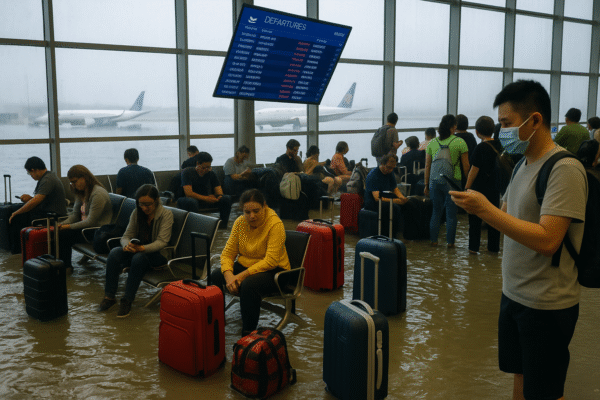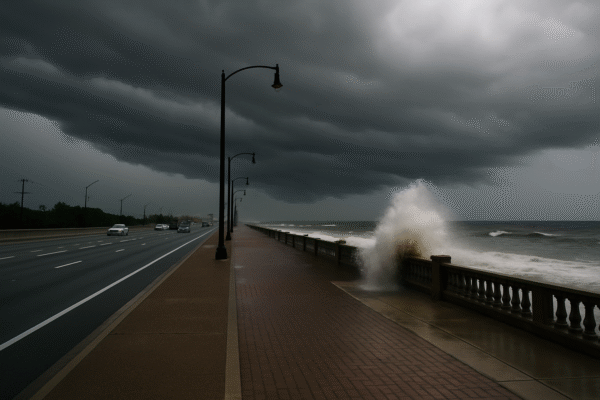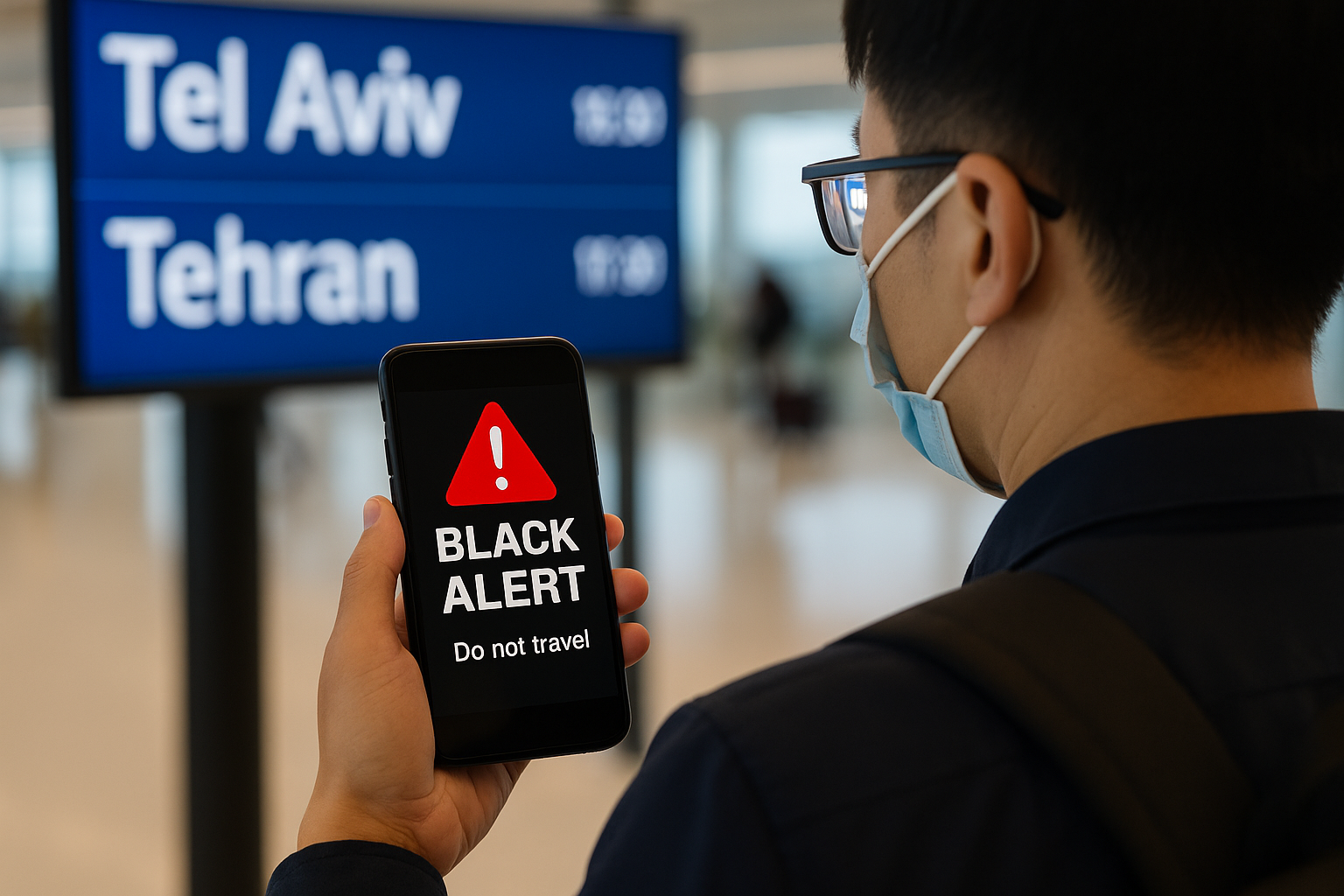Hong Kong – June 2025 – In response to the escalating military tensions between Israel and Iran, the Hong Kong Government has issued its highest-level travel warning—a “black” travel alert—for both countries. The decision, published on the Security Bureau’s Outbound Travel Alert System, reflects the intensifying conflict, which has led to mounting civilian casualties, widespread infrastructure damage, and growing security risks for foreign nationals.
The advisory follows a dramatic increase in airstrikes, missile attacks, and retaliatory military operations between the two nations, prompting Hong Kong authorities to strongly urge residents to avoid all travel to Israel and Iran until further notice.
What the “Black Alert” Means for Travelers
Hong Kong’s outbound travel advisory system is structured around a three-tiered color code:
- Yellow: Exercise caution
- Red: Consider postponing non-essential travel
- Black: Avoid all travel due to severe threat
Both Israel and Iran have now been placed under the black alert level, signaling that the risk to life and personal safety is considered critical.
“The security situation is highly volatile and unpredictable. Residents are strongly advised against any travel to the affected regions,” the Security Bureau announced in its statement.
The update brings Israel and Iran in line with existing “black alert” countries such as Lebanon and Syria, also marked by severe instability due to ongoing conflicts in the Middle East.
Rising Conflict and Civilian Casualties
The advisory follows recent Israeli airstrikes on nuclear infrastructure in Iran, which have triggered missile retaliation from Tehran, reportedly targeting populated areas in Tel Aviv and damaging key public facilities, including a hospital. Both nations have suffered significant civilian casualties, with reports indicating escalating fatalities and injuries among non-combatants.
Infrastructure across both countries—including residential buildings, medical facilities, and essential services—has been damaged, further heightening the risk for residents and travelers alike.
The Hong Kong government has based its decision on real-time intelligence, independent diplomatic assessments, and on-ground reports, prioritizing the safety and well-being of its citizens abroad.
Implications for Hong Kong Residents Abroad
For Hong Kong citizens currently in Israel or Iran, the Security Bureau advises:
- Depart as soon as it is safe to do so
- Monitor updates from local authorities and Hong Kong embassies or consulates
- Stay informed via official channels, including the Security Bureau’s Travel Alert Portal
- Register with the Immigration Department’s “Smart Travel” service for timely assistance and emergency support
The government has reiterated that travelers should ensure emergency contact numbers are accessible, maintain copies of travel documents, and avoid all high-risk areas or border regions.
Wider Regional Risks Across the Middle East
The Hong Kong travel advisory reflects a wider deterioration in Middle East stability, with ripple effects extending beyond just Israel and Iran. Neighboring nations, including Lebanon and Syria, are already on Hong Kong’s “black” travel alert list due to armed conflict, civil unrest, and regional instability.
The intensification of hostilities in the region has prompted several countries—including the United States, United Kingdom, and Canada—to update their own travel advisories, with warnings about regional escalation, missile activity, and potential airspace disruptions.
Security and Diplomatic Context
The conflict has heightened international concern, with the United Nations calling for immediate de-escalation to prevent further loss of life and regional destabilization. Diplomatic efforts to broker peace have so far yielded little progress, and analysts warn that continued military escalation could spread beyond current borders.
This has created substantial uncertainty for international travel, particularly for those planning business, humanitarian, or leisure visits to the region.
“Given the unpredictability of the situation, travelers must remain vigilant and be ready to alter or cancel their plans,” stated a representative from the Hong Kong Immigration Department.
Travel Insurance and Safety Protocols
The Security Bureau is also urging residents to:
- Secure travel insurance that covers political instability, emergency evacuations, and medical emergencies
- Regularly review airline policies, especially regarding potential flight reroutes or cancellations
- Avoid using overland transport near conflict zones, and always opt for official transport services if necessary
Travelers should avoid large gatherings, demonstrations, and politically sensitive areas, where the threat of attack or unrest may be elevated.
Broader Impacts on Tourism and Global Travel Safety
This black alert signals a major shift in tourism and aviation trends in the Middle East. Tour operators and airlines are already adjusting itineraries to avoid impacted airspace, and many are offering refunds or rebooking options to customers with travel scheduled to the affected regions.
As regional instability continues to escalate, the situation in Israel and Iran serves as a reminder of the fragile nature of international travel in conflict zones.
Final Thoughts: Prioritizing Safety Amid Global Uncertainty
With tensions surging and military operations intensifying, the Hong Kong government’s decision to issue a black travel alert for Israel and Iran is a firm precautionary measure aimed at protecting its citizens from serious harm.
While the conflict remains dynamic, travelers are encouraged to prioritize safety and flexibility, consult with local embassies, and stay informed through reliable sources.
As global security environments evolve rapidly, staying alert, registering travel plans, and following government guidance are essential steps for anyone traveling abroad in high-risk regions.
For more travel news like this, keep reading Global Travel Wire

















